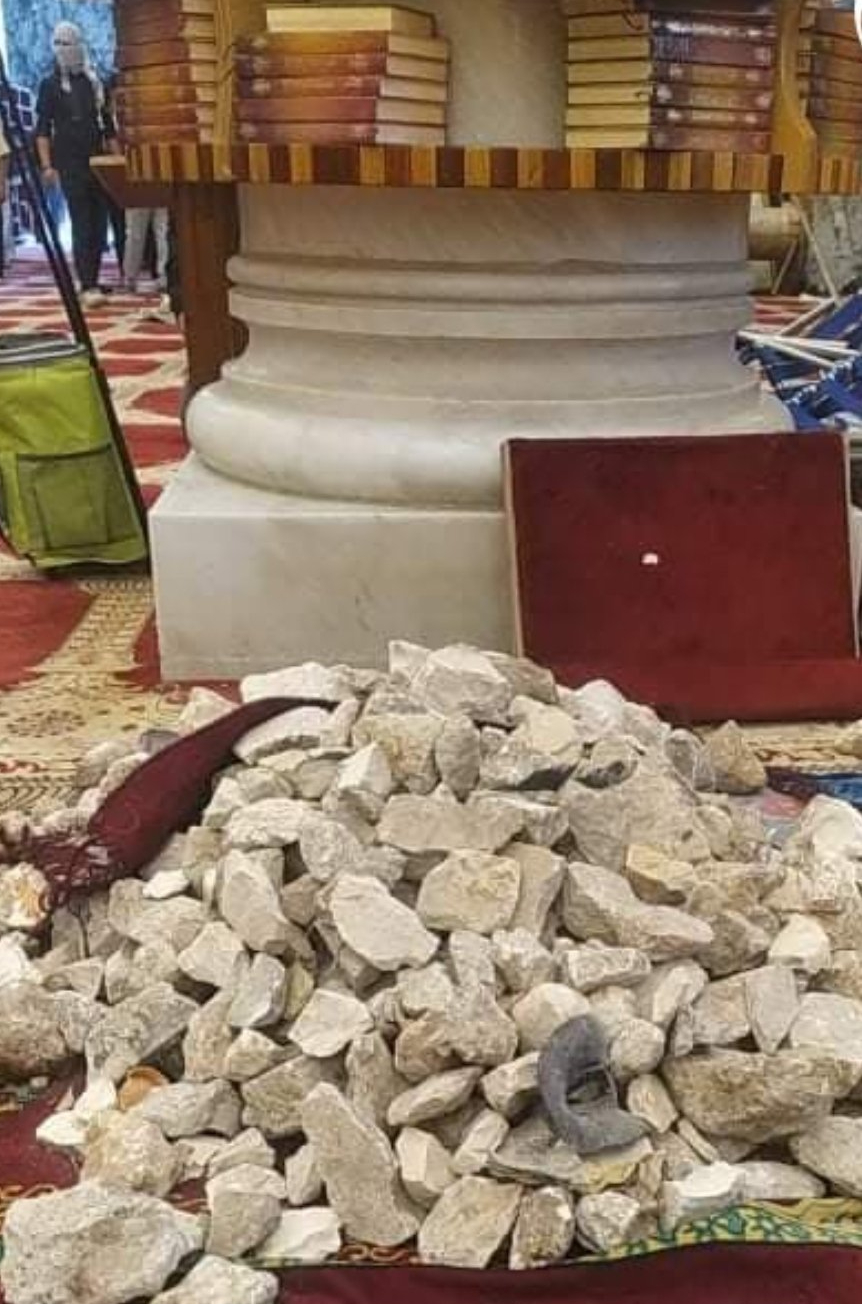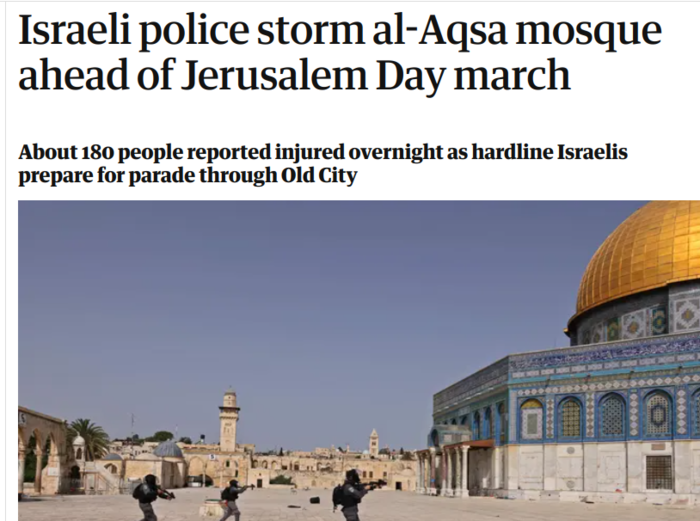Their Guardian’s latest report on the escalating violence in Jerusalem, by Jerusalem correspondent Oliver Holmes, with the incendiary headline “Israeli police storm al-Aqsa mosque ahead of Jerusalem Day march”, mirrors previous reports on the Palestinian riots.
It begins:
Israeli police faced off with Palestinian protesters in another full night of clashes in East Jerusalem, ahead of a planned parade by hardline Israeli nationalists through the Old City in an annual flag-waving march meant to cement Israeli claims to the contested area.
First, the day in question, Jerusalem Day, celebrates the reunification of Jerusalem on June 7th 1967 during the Six Day War, when Israel defended itself against three Arab armies who sought its destruction. The IDF’s capture of the ‘east’ part of the city occurred nineteen years after the 1948 Jordanian occupation and the expulsion of Jews from Atarot, Neve Ya’akov, the Old City and other Jerusalem neighbourhoods. During that time, Jews were not permitted to visit their holiest sites.
Additionally, whilst extremists do participate in the annual march through the Old City, Holmes’, in every report we’ve read, has consistently highlighted the Jewish extremists, or “hardliners”, who were increasing tensions, but failed to even allude to Palestinian extremism that’s fueling continued violence.
Here’s a mass demonstration at the Temple Mount on Friday, where Palestinian extremists are waving Hamas flags and chanting “In spirit and in blood, we will redeem al-Aqsa.”.
That same day, other Palestinian demonstrators urged Hamas to bomb Tel Aviv.
Additional pro-Hamas chants rang out during a Palestinian protest at Sheikh Jarrah on May 7th.
None of the Guardian reports we monitored (including the one we’re highlighting today) used an ideological or political pejorative to characterise even violent or pro-violence Palestinian protesters.
The Guardian continues:
The Palestine Red Crescent reported seven injuries, including four hospitalisations, as officers in riot gear clashed with Palestinian demonstrators clashed in East Jerusalem. Confrontations continued until after dawn, when police stormed into the Old City’s al-Aqsa mosque, the third holiest site in Islam, and fired stun grenades at worshippers, who lobbed stones.
The word here represents an artful way of obfuscating the fact that Palestinian “worshipers’ had stored rocks, fireworks and other dangerous objects in the holy mosque, to be used against Israeli security forces – planned violence which is what prompted police to enter the mosque in the first place.

After briefly mentioning a Palestinian attack on a Jewish motorist in the Old City, Holmes pivots to the issue of Sheikh Jarrah:
Tensions have soared in recent days in advance of the now-delayed Israeli court ruling on whether authorities were able to evict dozens of Palestinians from the Sheikh Jarrah neighbourhood, just outside the Old City and give their homes to Jewish settlers.
As our colleague noted earlier about the BBC coverage, the Guardian failed to provide readers (in this or other reports) with a proper background to that long-running story concerning property in the Sheikh Jarrah neighbourhood of Jerusalem.
“On February 10, 2021, the Jerusalem District Court upheld an October 2020 Jerusalem Magistrate Court decision, requiring a number of Sheikh Jarrah residents to vacate properties they are living in by May 2, 2021. Following this decision, the residents appealed to the Supreme Court. The Court has given the two sides until May 6, to report if they have reached a compromise to settle out of court. […]
According to the Supreme Court, the land in question “was owned by Chief Rabbi (Hacham Bashi) Avraham Ashkenazi and Chief Rabbi Meir Orbach until the War of Independence [1948], after they purchased it in 1875 from its Arab owners.”
Subsequently, two Jewish organizations, Va’ad Eidat HaSfaradim and Va’ad HaKlali L’Knesset Yisrael, worked to register the land with British Mandatory government in 1946.
The properties were registered with Israeli authorities under these two organizations in 1973.
These organizations sold the properties to the Nahalat Shimon organization in 2003.
According to a 1979 High Court decision, and re-affirmed repeatedly in subsequent cases, as in the case of any tenant living on someone else’s property, residents living on the land owned by these organizations were required to pay rent to the organizations that owned the properties. Their failure to do so, along with instances of illegal building and illegally renting properties to others, resulted in the current legal proceedings against them, culminating in the District Court decision.”
The issue of the tenants’ failure to pay rent, prompting court proceedings to evict them, has been consistently omitted by the Guardian, as well as by most British media reports about the Sheikh Jarrah controversy.
Meanwhile, more evidence has been compiled by Palestinian Media Watch suggesting that Mahmoud Abbas, possibly to divert attention away from the cancelled Palestinian elections, has been inciting more violence in Jerusalem – with TV broadcasts and Fatah controlled social media pages encouraging ‘martyrdom’ and calling on Palestinians to “redeem Jerusalem with [their] lives”.
But, such disturbing, far-right Palestinian incitement will be ignored by the Guardian throughout the current crisis in Jerusalem, as the media outlet insists that Palestinians can only be framed as victims, never moral actors whose bad decisions invariably lead to bad outcomes.
Related Posts
- The Guardian to Israel: We wish you were never born (CAMERA UK)
- NPR falsifies: Israeli police fire stun grenades on Muslims breaking Ramadan fast (CAMERA)





Another dodge the Guardian routinely uses is to refer to persons lobbing missiles from Gaza as “militants,” even though the missiles are aimed at civilian areas in Israel and launched from bases in civilian areas within Gaza. That’s a paradigm case of terrorism, not merely being “militant.”
“The Grauniad” is in the pocket of UK Labour-supporting trade unions and hence its aggressive anti-Israel bias. Any UK Jew who votes for the Labour party in any election is by default supporting The Grauniad’s anti-Semitic stance. He and she should desist from such voting now and without exception.
The anti-Israel reports by the ‘Grauniad’ are part of an organized campaign that many left-wing institutions like the BBC adhere to. It is just another aspect of the BDS campaign which is gradually being recognized and outlawed as simple antisemitism, which in itself is racist behaviour.
I would love for the current dispute between France and the UK over fishing rights to escalate to the point where fishermen decide that they will lob a few indiscriminate rockets into the UK, maybe as far as London, in defence of their ownership of the fish in the so-called “English Channel”. I wonder how the UK media would treat that story…